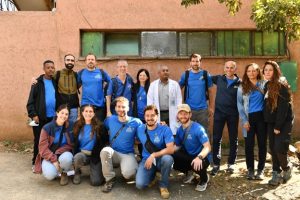
For the last two decades now, Ethiopia has been placing focus on expanding the manufacturing sector, which is expected to transform the economic landscape from agriculture-led one to that of industry-driven one.
To buttress the effort, the government has been allocating a huge sum of money. As a result, the expansion of Infrastructural facilities such as power, roads, railway and telephone & information communication technologies has proceeded apace. Industrial parks are entailed in the list.
The industrial parks, which provide a one-stop service, have created a fertile ground for combination of labor, capital and land which is an inception in making money.
The allurements have resulted in the influx of foreign investment from time to time. The emerging economies such as China, India, Turkey and others eye Ethiopia as a worthy investment destination.
Among the many industrial sites that mushroomed in the country, the Adama Industrial Park is playing a crucial role in hosting both foreign and local investment ventures.
The geographic proximity of the area to the Addis Ababa-Djibouti railway eases the export trade and the importation of inputs.
Gibreal Adem has been working as a head of the Department of the human Resource in the China Engineering Construction Corporation since 2016.
As to him, his company has signed agreement with the Ethiopian Development Corporation to engage in various construction works. Currently, the company has invested 147 million USD for constructing an Industrial Park in Adama town on 102 hectares of land.
In the park are found 19 shades with various hosting capacity. Six of the 19 shades are the largest and each shade is stretched over 11 thousand square meters of land. And 9 of them are built on 9500 square meter and 4 of them on 3 thousand square meters.
In addition, there is a commercial building which has police station; clinic and custom office. It renders a one-stop shot.
The 220 thousand square meter of the compound, which is connected with water pipeline, is fully asphalted. The park also boasts a cutting-edge technology for waste water treatment with zero liquid discharge.
This showcases how the government’s development effort goes in line with environmental protection. The construction of the park was accomplished with in four years. It was inaugurated last year by Prime Minister Dr. Abiy Ahmed.
Right after the inauguration, one Chinese company rented 12 shades and began producing textile. So far, it has created job opportunities for about 3 thousand youth.
There are also two Chinese companies working in the park. The first one is known as Kingdom. It is engaged in producing nylon, while the other, called Sunshine, produces wool. The total area of Kingdom Park is 32 hectares, while that of Sunshine 80 hectares. The other Chinese company known as Hunan is also constructing its own industrial park on 122 hectares of land.
Mis Chenja is a member of Kingdom Company. As to her, the company produces 10 percent of the world’s nylon output and covers 50 percent of Chinese export. Currently, it is installing the factory’s machinery. She said after three months it would begin an experimental production. Three months later it would be fully operational.
The company is the first and the largest investment group that allocated 200 million USD. It will introduce ultra-modern technologies from Italy and China. That helps for technology and knowhow transfer.
Its annual production is 5 thousand tones of nylon and 100 percent of it will be exported. It is estimated that it will generate revenue worth 45 million USD.
The company plans to make all the production and the managing system localized within three years. Workers are employed in accordance with the Ethiopian labor law irrespective of gender or religious background.
The first batch of local management staffs has already taken training courses to start the job. However, the officials of the company did not hide their complaints that the company has faced power outages several times. Unless remedial actions are taken the situation might result in bad outcomes.
Ethiopia is one of the least developed countries and agriculture is the mainstay of the economy. Almost 80 percent of the population earns its living from the sector. Such picture clearly indicates how the nation, with long history, is still subject to social and economic stagnation.
Hence, to create self-sustained-private-sector-led economy, expanding the manufacturing sector, which could absorb rural and urban unemployed labor, is vital. In addition, pulling the excessive rural labor burdened on unsustainable subsistence agriculture helps to advance structural change which is a tool in achieving transformation set by the Growth and Transformation Plan.
Obviously, attaining middle income status while 80 percent of the population is engaged in subsistence farming is unthinkable.
Hence, shifting the workforce from farming to the none farming sector is crucial and rising the contribution of the manufacturing and the service sector to the growth domestic production/GDP/ by reducing dependency on farming should be a must.
According to the recent report, agriculture still contributes 47 percent to the GDP which is un acceptable by any standard. This shows that there is a lot to be done to somehow replace its role.
The manufacturing sector has numerous advantages such as pulling Foreign Direct Investment (FDI), actualizing import substitution, boosting export, facilitating technology and knowhow transfer, creating job opportunities for growing population and utilizing agricultural products as an input towards value addition.
In sum, towards the furtherance of the multifaceted gains attributable to the burgeoning of the manufacturing sector attracting and maintaining the Chinese and other countries’ investment is essential.
The Ethiopian Herald Sunday August 25, 2019
BY ABEBE WOLDE GIORGIS





